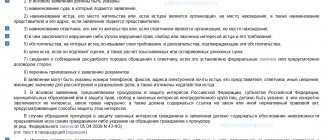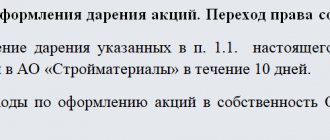Elena asked to clarify the following situation:
“Eight years ago my grandmother gave me an apartment. The agreement stated that she had the right to live there for the rest of her life. The agreement was certified by a notary and registered. Now she has filed a claim in court with a request to return her housing and terminate the gift agreement. Tell me whether the court can recognize the gift agreement as void and deprive me of property. Do persons other than the grandmother have the right to challenge the gift transaction?
It is quite difficult to cancel a gift agreement in practice; there must be good reasons for this.
How to donate property
In order to find out on the basis of what circumstances it is possible to terminate a transaction, you need to know how the donation is made.
Donation of property, things and real estate can be expressed in the form of:
- gratuitous transfer;
- promise to deliver by a certain date;
- exemption from the obligation to fulfill any requirement (for example, forgiveness of a debt for an apartment).
Donors can be:
- citizens, including close relatives;
- organizations.
For real estate donation transactions, compliance with the conditions is required (clause 3 of Article 574 of the Civil Code of the Russian Federation):
- written contract;
- registration of transfer of rights in Rosreestr.
The main requirement for making a gift is that the donor has ownership of the property.
Drawing up a statement of claim
certain requirements for the preparation of any statement of claim, including when challenging a gift agreement, as provided for in Art. 131 Civil Procedure Code (Civil Procedure Code) of the Russian Federation:
- written form of the document;
- indication of the details of the court, plaintiff and defendant;
- a brief description of the essence of the violation of the rights or interests of the plaintiff and his demands;
- grounds for challenging the gift agreement and evidence base;
- other information relevant to the case;
- a request to obtain the necessary documents or evidence, if the plaintiff does not have such an opportunity;
- list of attached documents, which is determined by Art. 132 Code of Civil Procedure: identification document of the plaintiff;
- a document confirming the sending of a copy of the statement of claim with additional documents to the defendant;
- copies of the statement of claim;
- a copy of the donation agreement;
- documents confirming its invalidity;
- a receipt confirming payment of the state duty.
Time limits for recognizing a donation as void.
For claims to recognize a transaction as void, the statute of limitations is 1 year by virtue of clause 2 of Article 181, 197 of the Civil Code of the Russian Federation.
If a voidable contract is declared invalid, the claims are considered before the expiration of 3 years on the basis of clause 1 of Article 181, 196 of the Civil Code of the Russian Federation.
Claims by other persons not participating in the transaction (i.e., other than the donor and the donee) are subject to a period of 10 years (clause 1 of Article 181 of the Civil Code of the Russian Federation). For example, the applicant may be the guardianship and trusteeship authorities and other government services.
The statute of limitations is prescribed by law, but the court is obliged to accept the claim even after its expiration (Article 199 of the Civil Code of the Russian Federation). The case is terminated only if one of the parties to the process claims that the statute of limitations has passed.
Consideration of the application and making a decision on it
In accordance with Art. 133 of the Code of Civil Procedure of the Russian Federation, the judge is given five days from the date of receipt of the statement of claim in court to accept it and issue a ruling on which to initiate a civil case. The court is obliged to notify the parties to the proceeding by means of a summons about its beginning and the date, place and time of the preliminary hearing. The arbitration court is obliged to send to the parties and participants in the process a copy of the ruling on scheduling a hearing of the case.
At the preliminary court hearing, the judge determines whether there is enough evidence in the case, whether the statute of limitations has been missed, listens to the opinions, objections and petitions of the parties on the issue under consideration, etc. If the judge recognizes the case as prepared, he issues a ruling on scheduling a trial on essentially . All parties and participants in the process are notified of the date, time and place of the meeting.
For your information
During legal proceedings and when making a decision, the court determines which of the circumstances that are relevant when considering a case challenging a gift agreement have been established and proven, which norms of law can be applied to the requirements specified by the plaintiff in the statement of claim, and whether the claim is subject to satisfaction.
The court decision is made in writing and signed by the judge . Its main part, the operative part, must contain the judge’s conclusion about the satisfaction of the plaintiff’s claims or their refusal, the distribution of legal costs, as well as the period and procedure for the parties’ possible appeal of the decision.
Which gift agreement is considered void?
The gift agreement is recognized as void (not concluded) by virtue of clause 1 of Art. 166 of the Civil Code of the Russian Federation in the presence of the following circumstances:
General terms and Conditions:
- the transaction violates the law (Article 168 of the Civil Code of the Russian Federation);
- the purpose of the transaction violates the principles of morality and ethics (Article 169 of the Civil Code of the Russian Federation);
- a transaction that does not imply consequences is imaginary (clause 1 of Article 170 of the Civil Code of the Russian Federation);
- covering up another purpose for concluding an agreement - a sham transaction (clause 2 of Article 170 of the Civil Code of the Russian Federation);
- execution of a transaction by a minor (under 14 years of age) - Article 172 of the Civil Code of the Russian Federation, by a minor (from 14 to 18 years of age) - Article 175 of the Civil Code of the Russian Federation, paragraph 1 of clause 1 of Article 575 of the Civil Code of the Russian Federation;
- signing a gift agreement under the influence of a misconception (for example, a citizen signs an apartment donation agreement, not understanding that he is transferring real estate into the ownership of another person and is deprived of the right of ownership) - Article 178 of the Civil Code of the Russian Federation;
- signing an agreement by a citizen with mental disorders in accordance with a medical report - Article 176 of the Civil Code of the Russian Federation, a judicial act - Article 171 of the Civil Code of the Russian Federation;
- conclusion of an agreement due to threats, deception, violence against the donor - Article 179 of the Civil Code of the Russian Federation;
- the gift agreement was signed by a citizen at a time when he could not control his actions (serious illness, severe emotional shock) - Art. 177 Civil Code of the Russian Federation;
- improper execution of an agreement (for example, an oral agreement to donate an apartment) - Article 574 of the Civil Code of the Russian Federation;
- transfer of property whose disposal is prohibited - Article 174.1, for example, an apartment under arrest by a court decision.
Special conditions:
The transfer of property as a gift is prohibited by law:
- employees of children's, medical and social institutions;
- state and municipal employees;
- commercial organizations other organizations for the purpose of activity - making a profit.
It is prohibited to donate jointly acquired property without the consent of the spouse. Learn more about what constitutes jointly acquired property.
Donation of property on behalf of the person represented by power of attorney is not permitted. Such transactions are considered void from the moment they are completed.
Arbitrage practice
Challenging a deed of gift is a complex and time-consuming process that requires legal preparation. The plaintiff will have to independently collect documents and evidence, speak at court hearings and convince the court that he is right. Only with a competent legal strategy will it be possible to achieve the desired result.
If the initiators of proceedings present a full range of evidence and weighty arguments, the courts usually satisfy their claims.
Here are some example solutions:
- Decision No. 2-402/2019 2-402/2019~M-331/2019 M-331/2019 dated June 25, 2021 in case No. 2-402/2019;
- Decision No. 2-5766/2019 2-5766/2019~M0-4649/2019 M0-4649/2019 dated June 25, 2021 in case No. 2-5766/2019;
- Decision No. 2-424/2019 2-424/2019~M-377/2019 M-377/2019 dated June 25, 2021 in case No. 2-424/2019.
When a gift transaction is contestable
The gift agreement is considered voidable by a court decision. This is in contrast to void transactions, which are considered invalid regardless of the presence of a judicial act, that is, by force of law.
Claims to declare a transaction voidable are filed by citizens whose rights are violated by the specified agreement. This includes both the donor himself and other citizens. For example, what is often found in practice are heirs (clause 2 of Article 166 of the Civil Code of the Russian Federation).
The legislation establishes the grounds for declaring a gift invalid - cancellation of the gift:
- Attempt on life, causing bodily harm to the donor or his relatives (Clause 1 of Article 578 of the Civil Code of the Russian Federation).
- Damage to property, threatening its loss. For example, careless handling of a fire - a stove in a private house (clause 2 of Article 2 of the Civil Code of the Russian Federation).
- It is possible to cancel a gift transferred by an organization or an individual enterprise until bankruptcy is completed (clause 3 of Article 578 of the Civil Code of the Russian Federation).
- If the donor survives the donee and this circumstance is indicated as a condition for the annulment of agreements (Article 578 of the Civil Code of the Russian Federation)
Return and refusal to accept a claim
Articles 134 and 135 of the Code of Civil Procedure define cases when a judge may decide to return a statement of claim or refuse to accept it. Any decision must be justified. Within five days, a reasoned ruling is issued, which is handed or sent to the plaintiff with the entire package of submitted documents. The statement of claim may be returned for the following reasons:
- challenging a gift agreement is beyond the jurisdiction of the judicial authority to which the claim was sent (when motivating the return of documents, the judge must indicate to which court the plaintiff should apply with this statement of claim);
- the application was submitted by an incapacitated person (incapacity can only be confirmed by a court decision) or a person who does not have the authority to do so (the authorized person does not have a power of attorney to conduct the case);
- the application is not signed by the plaintiff, is not drawn up in accordance with the form, has errors, or the necessary additional documents are not attached to it;
- a similar case (the parties, the subject of the claim and its grounds are identical to the one filed) is being processed by another court;
- Before the claim was accepted, the plaintiff himself withdrew his application.
Attention
If the claim was returned to the plaintiff, then after the violations have been eliminated, he has the right to re-file it.
A judge may refuse to accept a claim in the following cases:
- the application is not subject to consideration and resolution in civil proceedings;
- an application to challenge the gift agreement was filed by the plaintiff, whose rights and interests are not affected by the agreement;
- there is a ruling by another court to refuse the same case (the parties, the subject of the claim and the grounds are identical to the one filed) or a decision made by another court on it has entered into legal force.
If the plaintiff was denied acceptance of the statement of claim, then the same claim is not filed again . You can file a private complaint against the judge’s decision to return the application or to refuse to accept it.
If the donation is declared invalid.
When a court decision is entered into declaring the gift invalid, the donee is obliged to return everything received under the contract (Article 167 of the Civil Code of the Russian Federation, clause 5 of Article 578 of the Civil Code of the Russian Federation).
Data on registered rights to an apartment, return of ownership to the donor, are entered into the Rosreestr when a judicial act is provided. The keys are returned.
Based on this information, regarding the situation with the donated apartment, we explain the following:
- The court can invalidate the gift agreement at the request of the grandmother only if one of the above grounds is present: threat to life, damage to the apartment, etc.
- Heirs with a mandatory share in the event of the grandmother’s death can claim rights to the apartment. The statute of limitations for this claim expires after 2 years.
- When the contract is certified by a notary, the legal capacity of the citizen who is the donor of the property is checked (the notary must request from the donor certificates from the IPA and ND dispensaries). Cancellation of the transaction on the basis of Articles 176, 178, 179 of the Civil Code of the Russian Federation is excluded. Notarization is an additional guarantee of protecting the contract from being challenged in court.
Filing a claim in court
Claims to challenge gift agreements fall within the competence of district courts and are sent to the place of residence of the defendant (the donee or his heirs). Claims concerning legal entities or individual entrepreneurs related to their business activities are sent to arbitration courts at the location (state registration) of the legal entity or individual entrepreneur. The courts independently determine which of the methods established by law will accept documents from the plaintiff. A claim can be submitted:
- through the court office;
- directly to the judge who will conduct the case;
- by mail.
For your information
Arbitration courts also accept documents in electronic form according to rules specially established by law.
When filing a statement of claim through the court office, it is better to have a second copy , on which a stamp is placed with the date of acceptance of the documents and the incoming number. This may be important if there are errors or a dispute about the date of receipt of the application.
Example
Citizen Ovchinnikova T.Yu. filed on April 15, 2015 to the office of the district court at the place of residence of the donee, citizen R.D. Perepelkin, a statement of claim demanding that the gift agreement be declared invalid on the basis of Art. 177 of the Civil Code and apply to it the consequences of its invalidity. The application reached the judge a month later with a registration date of May 14, 2015. During the preliminary consideration of the case, the defendant stated that the plaintiff missed the statute of limitations, which expired on April 20, 2015. In this case, if citizen Ovchinnikova T.Yu. when filing the statement of claim, she did not have a second copy to put on it the date the court office accepted the documents; it is not known whether she will be able to prove that the statute of limitations was missed through no fault of hers. The judge may not accept her arguments and refuse to consider the claim.
The filing of the statement of claim directly to the judge who will conduct the case takes place at his reception . He can immediately check and certify (if the originals are available) the application and the documents attached to it. If there are any errors or the absence of all necessary documents, the judge will immediately point this out, which will reduce the time to eliminate them.
Statements of claim are most often sent by mail if the judicial authority to which it is filed is located in another location, and transportation costs for personal filing of documents significantly exceed postal costs .
Can relatives challenge a deed of gift during the life of the donor?
If the donor is not deprived of legal capacity or limited in it, the transaction was made in accordance with the requirements of the law and other legal acts, the donor was of sound mind and sober memory when making the transaction, the relatives of the donor do not have the right to challenge the agreement during his lifetime.
The owner disposes of his property at his own discretion, that is, he has the right to alienate it in any way, to any person and at any time.
The donor is not required to ask anyone's consent to dispose of his property, with certain exceptions. For example, when we are talking about property acquired during marriage, the donation of such property requires the notarized consent of the donor’s spouse, or when property is alienated by donation by a person limited in legal capacity due to alcohol or drug abuse, the mandatory consent of his trustee is required.







